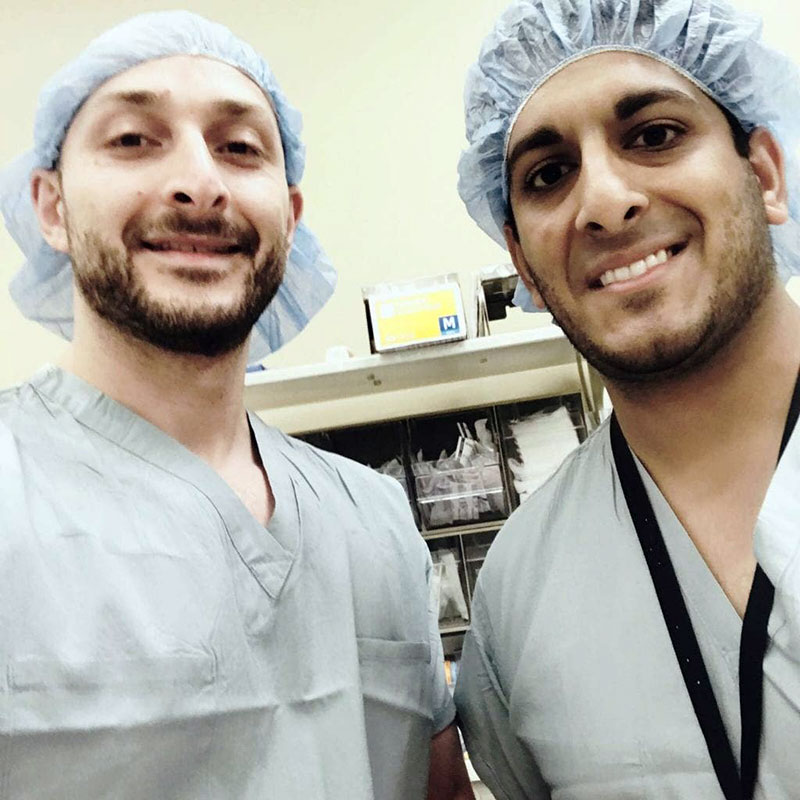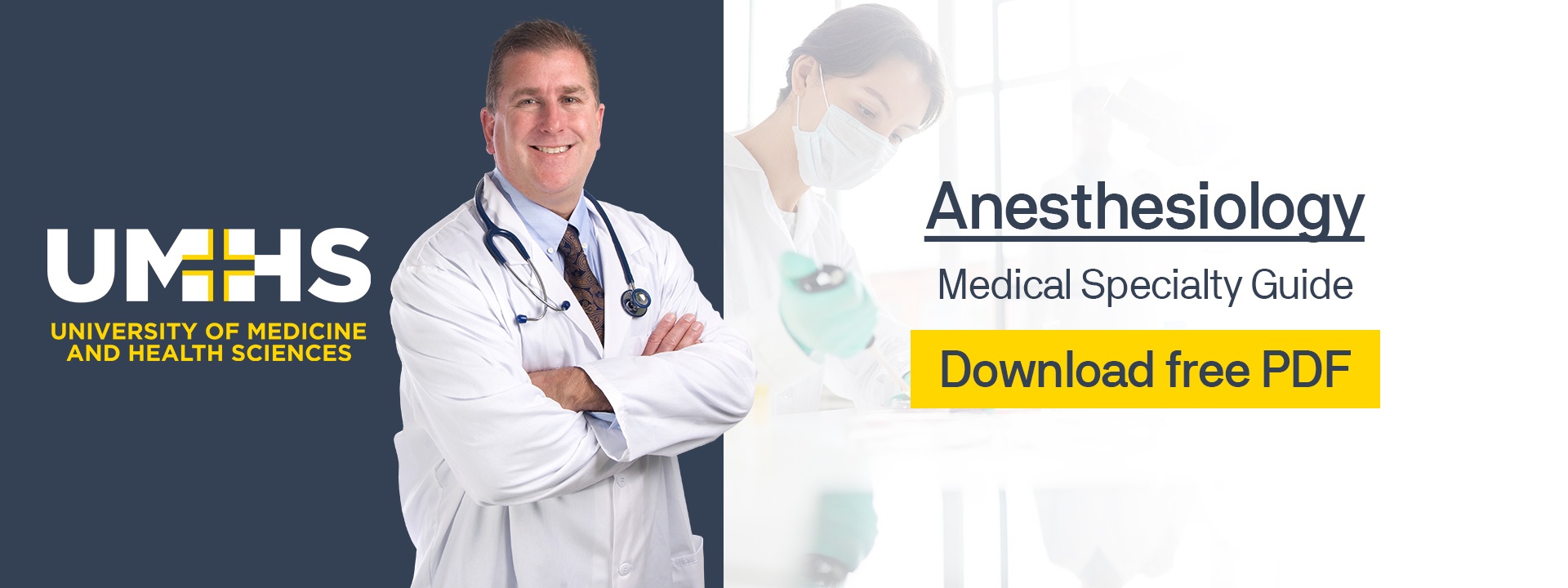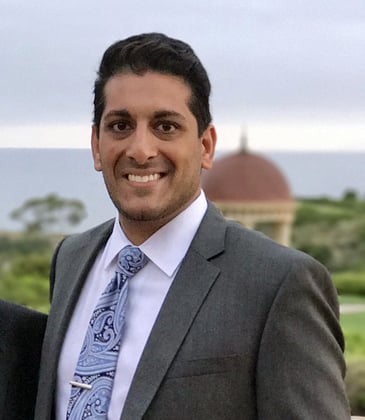Dr. Jay Kumar graduated from UMHS back in 2014. Along with his friend and fellow UMHS grad Dr. Andrew Letayf, Dr. Kumar was one of the first non-transfer UMHS students to Match in the competitive specialty of Anesthesiology. Despite being told he might have to settle for a different area of medicine because he attended a Caribbean medical school, Dr. Kumar was determined to become an Anesthesiologist since high school. “I realized that only I have the ability to decide my future,” he says.
The North Carolina native is currently completing his PGY-4 residency in Anesthesiology at Wayne State University/Detroit Medical Center and is waiting for the Match in October for a fellowship in Pain Management. In addition to working during his residency, Dr. Kumar has also had research published in peer-reviewed research journals, such as the prestigious Anesthesiology publication, Anesthesia and Analgesia,
Dr. Kumar recently contacted the UMHS Endeavour, wanting to share his success story with current and prospective med students. The Endeavour spoke to Dr. Kumar regarding how he first learned about UMHS from a college flyer and the reputation of the Ross family in medical education. He made the journey to St. Kitts and Nevis and actually looked at another school before deciding on UMHS. We spoke to Dr. Kumar about his medical education at UMHS, the road to residency, his plans for his upcoming fellowship, his research, advice for the residency Match, and more.
Discover if a career in Anesthesiology is right for you.
Learn why 89% of doctors would choose the same specialty again.
UMHS Endeavour: Tell us a little about yourself and where you are originally from.
Dr. Jay Kumar: I was born and raised in Charlotte, NC. I attended St. Bonaventure University and then went to UMHS in 2010. I am the first physician in entire family and soon my brother and sister will be joining the field of dentistry (with my sister starting dental school next July). I was lucky enough to know that I wanted to become an Anesthesiologist from high school and my passion for pain medicine started during my intern year and I am currently in the process of matching into a pain medicine fellowship that will start July 2018.
Why did you decide to go to UMHS?
I found out about UMHS from a flyer that was posted on the bulletin board of the basement of our science building at St. Bonaventure (One of those peel-off postcards that you can fill in your name with and send it in the mail for more info). I decided to go to UMHS because of the campus and the reputation that Warren Ross had from his previous school which was Ross University. When I was deciding where I wanted to attend, I actually visited another Caribbean medical school first and saw that it was an awful place where no students were smiling and seemed miserable. I decided to take the ferry and check out UMHS and saw the campus and felt that it would be a good place to go.
You were one of the first students to graduate from UMHS to get a competitive residency in Anesthesiology (of those who were not transfer students and started at UMHS from the beginning). Tell us about your final PGY-4 year at Wayne State University/Detroit Medical Center.
My final year of residency has been great so far. I am currently waiting for the Match in October for a Pain fellowship. I was lucky enough to Match at Wayne State University / Detroit Medical center which is a categorical program. I have the opportunity to teach my juniors and medical students and have been given a great deal of autonomy this year in particular. As a PGY-4, a lot is expected of me and I use that as motivation to work hard every day and be a role model to the residents and students that look up to me.

DR. ANDREW LETAYF & DR. JAY KUMAR: The two were among the first UMHS students to Match in Anesthesiology. Photo: Courtesy of Dr. Kumar.
You will be doing a fellowship in Pain Medicine, the most competitive in Anesthesia, starting in October. Can you tell us about this and where you’ll be doing it?
I have been lucky enough to get many interviews in Pain Medicine this past year. Match will be October 4th and I am eager to find out where I will be completing my fellowship.
You were told that it was literally “impossible” to obtain an Anesthesiology residency because you attended UMHS, yet you overcame the odds and other students have done so after you. What advice do you have for students wanting to pursue competitive residencies?
When I went to UMHS to visit when I was an undergraduate student, I was told by some of the faculty there that “most likely you will end up doing Internal Medicine just based on the previous track record of most Caribbean students.” I remember that I took those words to heart and I made sure that every day I would do whatever I could to Match in to Anesthesiology and would not let others dictate or influence my path. I realized that only I have the ability to decide my future and what career path I wanted to pursue. The one piece of advice I have for current UMHS students is to do whatever needs to be done in order to strengthen your application. If you have to travel across the country every six weeks, email 350 hospitals to find an “audition” rotation, call every program coordinator in the country, do whatever you have to in order to put yourself in the best position possible for Match. You will try, get frustrated, angry, annoyed, etc., etc. but do not give up on your goals. If you are determined enough, anything is possible. When I started my fourth year and was trying to secure an “audition” rotation, I literally emailed probably 300 or so programs/hospitals throughout the country and was finally able to secure two Anesthesia rotations, one of them being at the place where I ended up Matching (Wayne State University/Detroit Medical Center).
Was there anything specific about your medical education at UMHS and clinical rotations that prepared you well for Matching?
With our clinical rotation site, Sinai Grace Hospital, in Detroit, MI, I was able to build contacts and network with the other DMC hospitals and staff to obtain letters of recommendation and eventually rotate through the Anesthesia department at the downtown DMC location. I also learned that if I was flexible with my rotations and scheduling clinical electives that I was able to complete my requirements much faster and thus graduate within a four-year time span.
Are there any advantages or disadvantages for students at Caribbean medical schools regarding the Match process?
There are a countless number of disadvantages from attending a Caribbean medical school. Much of which I do not need to go into detail with, but they can all be overcome with dedication and hard work. I remember in an interview for residency four years ago. A program director literally told me “I’d rather take a student that is top 10% of their Caribbean medical school class than take an American graduate that is mediocre or bottom of their class.” I think that Caribbean medical students learn to become self-sufficient while many American medical students are “spoon fed” or helped every step of the way. I feel that if you have to learn the process of how things work on your own, like you do with most Caribbean medical schools, that you become stronger and more confident and thus become a better applicant for residency programs.
What are some of the aspects of Anesthesiology that you find the most interesting?
Anesthesiology is a field that I knew I wanted to be part of since I was in high school. I love the acute care aspect of Anesthesia along with the lifestyle that comes along with it. Anesthesiology requires you to an expert in pathophysiology, pharmacology and quick decision making. Many times, people think Anesthesiologists do not do anything. However, when things go wrong the only physician that is able to handle critical situations is an Anesthesiologist. We are critical thinkers, quick decision makers and have more responsibility and risk than any other physician.
What advice do you have for current UMHS students, and medical students in general, about the Match process?
The Match process can be a very worrisome time for many medical students. The key thing to remember is to always think positive and never give up. Things always have a way of working out and faith in the Match process is a very crucial thing to have. Never be too over confident and never sell yourself short. Always have a backup if you are applying for a specialty field (i.e., my backup was Internal Medicine if I did not Match into Anesthesiology).
Do you have any specific goals for your upcoming fellowship?
My main goal is to hopefully Match into a fellowship that will allow me to become a great interventional pain physician. My passion is geared towards neuromodulation which in my opinion the “future of pain medicine.” And a fellowship that will allow me to expand on that passion would be my ideal place to train.
Tell us a little about “Battlefield Acupuncture and Its Use in Multimodal Perioperative Anesthesia Care," the study at John D. Dingell VA Medical Center.
We recently received IRB approval for this study at the VA medical center. There are two arms to this study.
The first arm of the study is entitled: “Battlefield Acupuncture and Its Use in Multimodal Perioperative Anesthesia Care.”
Our hypothesis and goal is to show how Perioperative battlefield acupuncture for general surgery and urology cases undergoing general anesthesia will decrease opioid requirements, postoperative pain, and the incidence of PONV and perioperative anxiety, length of stay and morbidity and mortality in comparison to sham perioperative battlefield acupuncture.
The second arm of the study is entitled: “Postoperative Traditional Acupuncture and Its Use in Multimodal Perioperative Anesthesia Care.”
Our hypothesis and goal is to show how Perioperative traditional acupuncture for orthopedic surgery cases undergoing spinal (neuraxial) anesthesia will decrease opioid requirements, postoperative pain, incidence of PONV and perioperative anxiety, length of stay and morbidity and mortality in comparison to sham perioperative traditional acupuncture. Perioperative traditional acupuncture will also increase participation and compliance of postoperative physical therapy.
We are currently collecting data and have been getting great results. As the first author on the study, my goal is to hopefully obtain enough data to present it at the next Pain Medicine meeting in 2018 in Vancouver Canada.
You've recently been published in peer-reviewed research journals. Can you tell us about “Short-term vision loss following Whipple surgery: A Case Report" and other recent research you wish to comment on?
I have published many articles over the past four years, two of which were accepted into our major Anesthesiology journal: Anesthesia and Analgesia. I was fortunate to have the support of my program/staff in order to get these articles and case reports published and it has helped me a great deal during my fellowship Match process as well as my overall education and learning.
Read about other successful medical school Alumni on the UMHS website and Endeavour Blog.
About UMHS:
Built in the tradition of the best U.S. universities, the University of Medicine and Health Sciences focuses on individualized student attention, small class sizes and recruiting high-quality faculty. For these reasons, UMHS is quickly becoming the school of choice among Caribbean medical schools.

Scott is Director of Digital Content & Alumni Communications Liaison at UMHS and editor of the UMHS Endeavour blog. When he's not writing about UMHS students, faculty, events, public health, alumni and UMHS research, he writes and edits Broadway theater reviews for a website he publishes in New York City, StageZine.com.
















